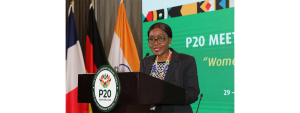
● Eino Vatileni
Speaker of the National Assembly, Hon. Saara Kuugongelwa-Amadhila says Namibia is among the worst affected countries by climate change but misses out on funding due to its income classification.
The speaker said Namibia, due to the classification, struggles to get funding to deal with emergency situations resulting from climate change that affected vulnerable communities. She made these remarks while making her intervention during a session at the P20 2nd Meeting of Women Parliamentarians in Cape Town under the topic: “Women and finance for a just energy transition” on Monday.
“Just as it is important to ensure that women are not left behind by way of providing them with support as we ensure the just transition to clean energy, we also need to ensure that countries that are most affected by climate change such as Namibia may not qualify as vulnerable because of the Per Capita Income,” the Speaker said.
She added, “‘ Namibia is considered one of the most affected countries by climate change but because of its Per Capita Income, we do struggle to get assistance to deal with emergencies that are related to climate change,”.
According to the Speaker, such would mean that ‘interventions that assist communities are also suffering because they rely on government funding and do not benefit from international funding’.
Speaking on women struggles to access funding, speaker kuugongelwa-Amadhila said women usually do not have the means to provide security to the funding that they want to raise.
“Many of them are not educated to be able to write business plans that will inspire the financial institutions to lend them money. Many of them have organised themselves in financial cooperatives in Namibia for example, and we have seen that in some sectors women have become the leading participants such as the housing sector by producing the low cost housing that is helping to transform our informal sector where poor communities live in shacks,” she said.
The speaker suggested that there is a need to train the women but also to support the capital development market initiatives for countries like Namibia who have a formal capital market but are not deepened enough and there is no adequate capacity to enable financial institutions to deploy such funding.






